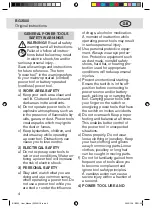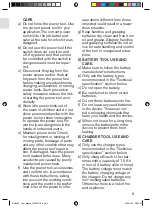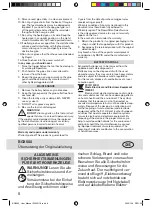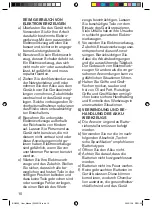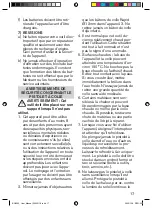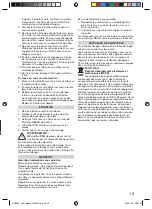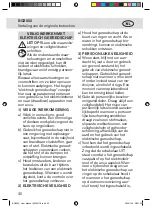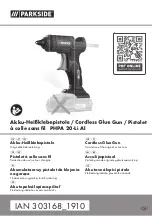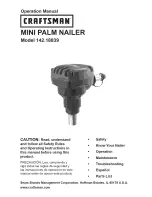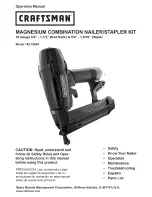
5
CARE
a) Do not force the power tool. Use
the correct power tool for your
application. The correct power
tool will do the job better and
safer at the rate for which it was
designed.
b) Do not use the power tool if the
switch does not turn it on and
off. Any power tool that cannot
be controlled with the switch is
dangerous and must be repai-
red.
c) Disconnect the plug from the
power source and/or the bat-
tery pack from the power tool
before making any adjustments,
changing accessories, or storing
power tools. Such preventive
safety measures reduce the risk
of starting the power tool acci-
dentally.
d) Store idle power tools out of
the reach of children and do not
allow persons unfamiliar with the
power tool or these instructions
to operate the power tool. Po-
wer tools are dangerous in the
hands of untrained users.
e) Maintain power tools. Check
for misalignment or binding of
moving parts, breakage of parts
and any other condition that may
affect the power tool’s opera-
tion. If damaged, have the power
tool repaired before use. Many
accidents are caused by poorly
maintained power tools.
f) Use the power tool, accessories
and tool bits etc. in accordance
with these instructions, taking
into account the working condi-
tions and the work to be perfor-
med. Use of the power tool for
operations different from those
intended could result in a hazar-
dous situation.
g) Keep handles and grasping
surfaces dry, clean and free from
oil and grease. Slippery handles
and grasping surfaces do not al-
low for safe handling and control
of the tool in unexpected situa-
tions.
5) BATTERY TOOL USE AND
CARE.
a) Make sure to follow the battery
manufacturer’s instructions.
b) Only use the battery types
recommended in the “Technical
specification” section below.
c) Do not open the battery.
d) Be careful not to short-circuit
batteries.
e) Do not throw batteries into fire.
f) Do not leave any used batteries
in the device. These can cor-
rode, releasing chemicals that
harm your health and the device.
g) When not in use for a long time,
remove the batteries from the
device to prevent them from
leaking.
6) CHARGER TOOL USE AND
CARE
a) Only use the charger types
recommended in the “Technical
specification” section below.
b) Only charge Bosch Li-Ion bat-
teries with a capacity of 1,5 Ah
or more (4 battery cells or more).
The battery voltage must match
the battery charging voltage of
the charger. Do not charge any
non-rechargeable batteries.
Otherwise there is a risk of fire
and explosion.
BGX500_User_Manual_20220118.indd 5
BGX500_User_Manual_20220118.indd 5
2022/1/19 ��11:23
2022/1/19 ��11:23




